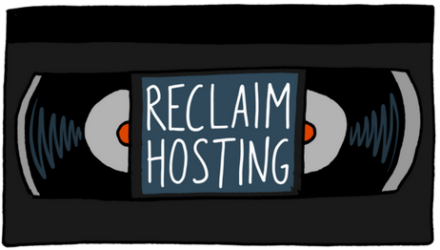 After linking to the “One Terabyte of Kilobyte Age Photo Op” Tumblr in my last post, I started reading around a bit on the Geocities research blog. This post by Olia Lialina (pioneer web artist and theorist) about Neocities got me thinking a lot about how we are framing Domain of One’s Own here at UMW. Neocities is a project by Kyle Drake to “help me keep the creative, independent internet alive!” and it’s built in the spirit of Geocities. Lialina has some deeply insightful observations that she jotted down as soon as the service went public this Summer that I’m finding helpful to think more broadly about building community around DoOO.
After linking to the “One Terabyte of Kilobyte Age Photo Op” Tumblr in my last post, I started reading around a bit on the Geocities research blog. This post by Olia Lialina (pioneer web artist and theorist) about Neocities got me thinking a lot about how we are framing Domain of One’s Own here at UMW. Neocities is a project by Kyle Drake to “help me keep the creative, independent internet alive!” and it’s built in the spirit of Geocities. Lialina has some deeply insightful observations that she jotted down as soon as the service went public this Summer that I’m finding helpful to think more broadly about building community around DoOO.
We have the basic hosting worked out, we’re currently exploring more sophisticated syndication, but we still need to figure out how to imagine community more broadly. In this regard I think the same is true for Reclaim Hosting—in order for both to be more than just hosting they have to be able to expose what’s happening around the community.
As she was testing out Neocities soon after its launch, Lialina notes that….
There are still people out there who can write HTML, want to have their homepages made by hand and want to express themselves through HTML code. What seems lost is the idea (or skill) to make links to each other, manually, to build anything outside of your own “profile”. Neocities users do not link to other users’ pages, except user youpi and myself.
This idea of isolation in managing one’s own site is a theme that recurs through the first impressions. What’s more, I think it’s also apparent for anyone who has been blogging for a while. The slow death of the blogosphere is just that, the cultural amnesia that links between sites and people is what makes the web. Like with syndication, we want this to happen as a part of a siloed service like Facebook or LinkedIn—the idea of a personal profile seems almost divorced from the social self online—and that is something we need to challenge with DoOO.
There is also a discussion about the changing rhetoric around Geocities over time. In 1996 and 2004 Geocities was referred to as a priosonhouse of one’s content. Free web hosting services like Geocities “were seen as a prison for creativity and self expression.” There was a push to controlling your own webspace through commodity web hosting services like Bluehost and the like. But the rhetoric around Neocities, an updated verion of Geocities in many ways, is framed by Kyle Drake as a….
….place for the users to be “in complete control of the content and presentation they provide to their audience”. It is of course an over-over-statement. However, compared to the industrialized nothingness Facebook offers, any “pimp my profile” service can be regarded as offering “complete control”.
This is fascianting to me because the critiquing of Geocities in 1996 and 2004 was not so much about ownership as it was about ease of use. For the replacement was not cheap commodity web hosting for most folks, but rather “the industrialized nothingness Facebook offers.” So much so that something like a simple, third-party service for hosting HTML pages seems like the second coming of Freedom online. What an interesting shift in the rhetoric of the web over the last 15 years or so. There’s a dissertation in that alone.
But what is most interesting and useful for me in her early impressions is the fact that Neocities is cultivating a series of disconnected sites that don’t foster community. No one is linking to anyone else, and that frames the “beginning of the end.”
Very bad move: Calling it Neocities and not starting with neighborhoods. When Yahoo bought Geocities, they only offered vanity profiles and discontinued neighborhoods and suburbs. Users became isolated, it was the beginning of the end.
How do we build neighborhoods in DoOO and Reclaim Hosting? Is it around topics? -interests? -academic disicplines? -academic departments? -courses? -people? I imagine some combination of all these will be the case? And the more I think about it the more the idea of rolling out DoOO by a class of students, i.e. freshamn, didn’t make all that much sense for the project. The success of DoOO is going to depend as much on academic programs, courses, departments, and individuals—and like everything else we’ve done at UMW it will depend on an organic push. I’m just wondering what the idea of “neighborhoods” looks like for DoOO and how we might start experimenting along those lines.

